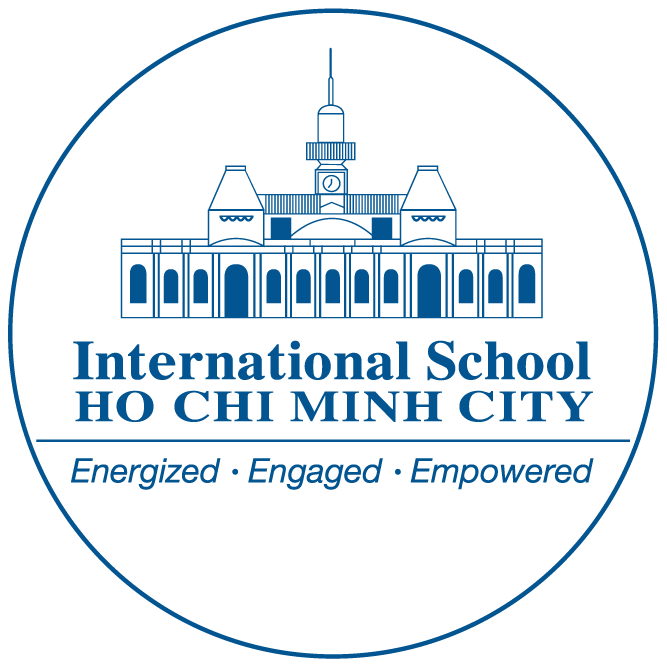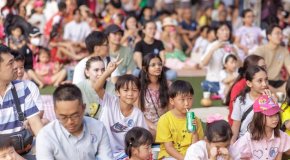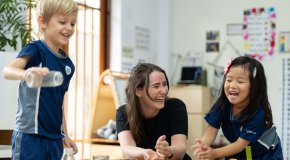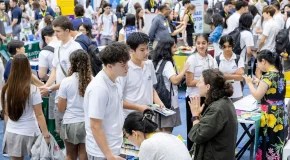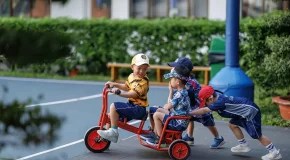What Is Service Learning in the IB Curriculum?
Students thrive when they connect what they learn in the classroom to the world around them. Today’s families are looking for more than strong academic results. They want their children to grow into leaders with purpose, responsibility, and compassion. Service learning offers a powerful way to nurture these qualities and build lasting character.
This educational approach integrates curriculum with meaningful action. Students identify challenges in their communities, research solutions, take initiative, and reflect on the impact of their work. At the International School Ho Chi Minh City (ISHCMC), service learning is embedded across the International Baccalaureate (IB) programmes. It supports students in becoming internationally minded individuals who apply knowledge in practical, compassionate, and forward-thinking ways.
What Is Service Learning?
Service learning is a structured learning experience where students apply academic knowledge to meet community needs. It is planned, student-led, and reflective. For example, a MYP student might explore global food insecurity in their Individuals and Societies class, then design and lead a sustainable food drive campaign benefiting underserved communities in Ho Chi Minh City. Another might connect a science unit on environmental impact to launching a plastic-free initiative across the school, working with peers to implement real-world solutions and reflecting on their impact through digital storytelling.

This process aligns with ISHCMC’s inquiry-based learning approach, which encourages students to ask deep questions, explore real-world issues, and engage in purposeful action. Students build agency, understand complex systems, and develop the mindset to contribute meaningfully to the world.
Benefits of Service Learning for Students
Parents want to see their children develop confidence, integrity, and resilience alongside academic growth.
 Service learning provides a foundation for these outcomes by allowing students to lead, collaborate, and grow through authentic experiences:
Service learning provides a foundation for these outcomes by allowing students to lead, collaborate, and grow through authentic experiences:
- Empathy and global perspective: Students engage with real-world challenges that help them appreciate different cultures, identities, and perspectives.
- Leadership and initiative: They set goals, coordinate teams, and manage real projects with visible outcomes.
- Collaboration and communication skills: Students work in diverse teams and develop the ability to express ideas, listen actively, and respond constructively.
- Critical thinking and problem-solving: They investigate issues, analyze root causes, and design practical solutions with long-term impact.
- Deeper academic engagement – When students apply their learning in meaningful contexts, they develop stronger connections to subjects and take greater ownership of their education.
At ISHCMC, this approach is part of the school’s whole-child philosophy, which supports students in developing intellectually, socially, and emotionally. Service learning prepares students not only for academic success but also for the responsibility of leading purposeful lives.
Core Elements of Service Learning
Successful service learning requires intentional planning, guided reflection, and a framework that supports personal and academic development. At ISHCMC, projects are designed with the following key components:
- Student voice and community relevance – Students identify local or global needs and co-create solutions based on their interests, strengths, and learning goals.
- Purposeful and structured action – Projects include a clear objective, step-by-step planning, and measurable results.
- Preparation and ethical guidance – Students conduct background research, build necessary skills, and consider the ethical implications of their work.
- Ongoing reflection – Students pause regularly to evaluate their experiences, assess their impact, and articulate their learning.
- Improvement and adaptation – They review their project outcomes and refine their approach to increase effectiveness.
This model reflects the IB’s Approaches to Learning (ATL) framework, emphasising research, communication, social, and self-management skills.
How ISHCMC Promotes Service Learning Projects
Service learning is integrated into all three IB programmes at ISHCMC: the Primary Years Programme (PYP), the Middle Years Programme (MYP), and the Diploma Programme (DP). As students progress through each stage, they take on increasing levels of independence, responsibility, and complexity in their projects.
Learning through service begins with simple classroom actions in the early years and evolves into long-term, student-led initiatives in the MYP and DP. Teachers act as facilitators, helping students connect their learning to local and global contexts.
Health and Wellness Focus
Students address wellbeing through awareness campaigns, fitness initiatives, and peer support programs. In the DP, students often explore these themes through the Creativity, Activity, Service (CAS) requirement, where they develop and carry out sustained projects that support community health and emotional wellbeing.
Regarding real-world examples, ISHCMC reintroduced its Wednesday Period 5 Service Learning period as a strong commitment to student wellness and leadership development. Over 103 students trained as service leaders, launching initiatives ranging from emotional first-aid to physical health awareness. Across three trimesters, 614 students engaged in 102 service groups, each choosing their involvement during a Service Fair and celebrating achievements at trimester-end showcases. These events were almost entirely student-led, reinforcing leadership, wellness, and reflection.
Art Focus
Students express ideas connected to identity, diversity, and social justice through visual arts, music, or performance. Younger students may create posters to promote kindness and inclusion, while older students develop exhibitions or performances to raise awareness of important issues.

In one powerful example, Rosie (Grade 4) showcased her understanding of cultural identity and gender representation through dance at the Bangkok Dance Championship — a project that started in art class and evolved into an award-winning international performance.
Inclusion Focus
Students explore ways to promote equity and belonging within the school community. Projects include buddy programs, peer mentoring, and accessibility-focused design initiatives. These actions reflect ISHCMC’s commitment to building a respectful, inclusive environment where every student feels valued.
The updated IBCORE curriculum in Grades 6 to 10 reflects ISHCMC’s inclusive vision by placing student agency at the center. Each grade explores a unique theme focused on social contribution. Grades 6 and 7 dive into what it means to be a changemaker. Grade 8 leads collaborative efforts through the Community Project. Grades 9 and 10 build on their strengths to make meaningful professional contributions. Every stage connects directly to the United Nations’ 17 Sustainability Goals, allowing students to engage in purposeful, inclusive service learning.
Literacy Focus
Students support language development through storytelling, reading partnerships, and resource creation. Many lead bilingual reading sessions or organize book drives supporting schools and children’s libraries. These experiences promote cross-cultural understanding and contribute to academic empowerment.
Creative Focus
Students apply design thinking to address practical problems. Projects involve creating sustainable packaging, developing safety tools, or running awareness campaigns. These initiatives are often connected to MYP interdisciplinary units and build skills in innovation and entrepreneurship.
At ISHCMC, students participated in a “Speaker Series” featuring nine local and global changemakers working in sustainability. These dialogues inspired students to brainstorm, prototype, and present service ideas rooted in problem-solving and global citizenship.
Sports Focus
Athletics projects promote teamwork, resilience, and leadership. Students coordinate inclusive sports events, organize charity tournaments, or use physical education as a platform to promote wellbeing and social cohesion. ISHCMC’s Stingray Swim Team, a member of the SISAC conference, exemplifies these values.
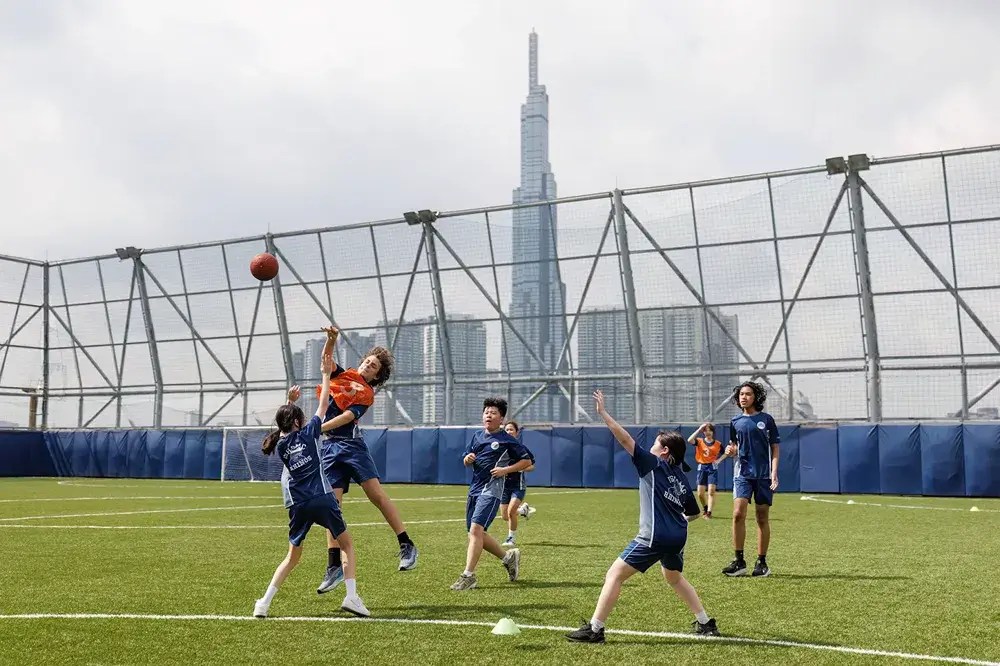 Technology Focus
Technology Focus
Students use digital tools to develop meaningful solutions. Initiatives have included mental health apps, digital storytelling platforms, and peer-to-peer tech training. ISHCMC’s technology integration, including MacBooks for Grades 6–12 and iPads in lower grades, enables students to act confidently and responsibly in the digital world.

Each of these areas reflects ISHCMC’s vision of education: learning that applies in real-world contexts and prepares students to lead with purpose.
One Vietnamese student’s tech project, a custom-designed bicycle built with sustainability principles, was acquired by McLaren. That same student credited ISHCMC’s emphasis on applied learning and EdTech exploration for making this dream a reality.
Why It Matters: Building Future-Ready Global Citizens
Students need more than theoretical knowledge to thrive in a global, rapidly evolving world. They must think critically, collaborate across cultures, and take initiative with empathy and integrity. Service learning develops these qualities through real engagement, guided learning, and reflective practice.
At ISHCMC, service learning supports students in becoming active participants in their communities, locally and globally. It helps them discover their strengths, clarify their values, and lead projects that reflect who they are and what they care about.
Families seeking an education that combines academic rigor with leadership development, community engagement, and real-world readiness will find that ISHCMC provides this balance. Students graduate with the confidence and experience to succeed, and the mindset to make a difference.

